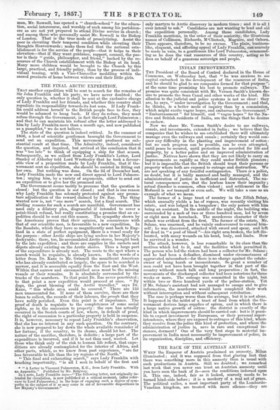INDIAN IMPROVEMENTS,
THE President of the Board of Control declared in the House of Commons, on Wednesday last, that "he was anxious to see capital embarked in the development of tho resources of India, and he should be glad to see companies formed for that purpose"; at the same time promising his best to promote railways. The promise was quite consistent with Mr. Vernon Smith's known desire to promote the Soan Canal and other works of the kind. His allusion to the judicial and police systems is not so clear : they are, he says," under investigation by the Government ; and that, he thinks is a better mode of inquiry than by a commission, which might excite vague hopes, and embarrass the Government." " Embarrassment " for himself, and "vague hopes" for the Native and British residents of India, are the things that he desires to eschew.
Now we share Mr. Vernon Smith's desire to see railways, canals, and investments, extended in India; we believe that the companies that he wishes to see established there will ultimately manage even the railways and canals ; certainly they would conquer any difficulty in the planting and improvement of cotton: but no such progress can be possible, can be even attempted, until peace be secured, until protection be accorded for life and property, by a better police and an improved administration of justice. Natives have shown that they are not likely to carry on improvements so rapidly as they could under British pioneers;
but it is impossible that the British should trust their persons or property where both are exposed to outrage and destruction. We are not speaking of any fanoiful contingencies. There is a police, no doubt, but it is badly manned and badly managed, and the administration of justice is inefficient and distrusted. The natural consequences are, that the lawless know their impunity ; actual disorder is common, often violent ; and settlement in the Mofussil is not tranquil or even safe. We will take a ease as an example of what we mean.
The farmer of a large tract of country in the Zillah Behar, which annually yields a lac of rupees, was recently visiting his estate, and was lodged in a bungalow; the only person with him being an assistant. In the middle of the night, the building was. surrounded by a mob of two or three hundred men, led by seven or eight men on horseback. The murderous character of their attack was evident from the first. The farmer of the estate, Mr. Bolan°, was unarmed, and he-vainly endeavoured to conceal himself ; he was discovered, attacked with sword and spear, and left for dead in "a pool of blood "—his eight arm broken, the left dislocated, with many wounds on his head, body, and limbs. How he survived is a wonder.
The attack, however, is less remarkable in its class than the
motives which led to it, and the facilities which permitted it. The person who led the rioters had been a collector for Mr. Solana; and he had been a defaulter, dismissed under circumstances of aggravated misconduct—for there is no charge against the estateowner of being harsh or inconsiderate. So great a number of men could not have been brought together in that part of the country without much talk and long preparation; in fact, the movements of the discharged collector had been notorious for three weeks or more. The outrage was committed in the night, but within two or three hundred yards of the police-station. Yet if Mr. Sole.no's assistant had not managed to escape and to give information, the murderers would have completed their work without interruption and without subsequent retribution. The case is perhaps worse than the average, but it is not alone.
It happened in the midst of a tract of land from which the Government derives large supplies of opium, and in which there is a large native growth of cotton : the district is exactly of the kind in which improvements should be carried out: but is it possible to expect investment by Europeans, or their personal superintendence, where they are exposed to outrages of this kind, where they receive from the police this kind of protection, and where the administration of justice is, save in rare and exceptional instances, dormant? One of the very first steps to material improvement in India must necessarily be improvement of police, in its organization, discipline, and. efficiency.


































 Previous page
Previous page